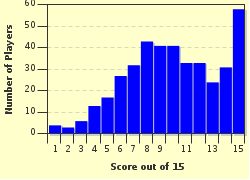Quiz Answer Key and Fun Facts
1. For $100, according to John's gospel, how many baskets of leftovers were gathered up by the disciples following the feeding of the 5,000?
2. For $200, of whom or what was it said in Matthew 6, that 'not even Solomon in all his splendor was dressed like one of these'?
3. For $300, when Jesus sent the twelve disciples out in Mark 6, what were they allowed to take with them?
4. For $500, how long, according to Luke 6, did Jesus spend praying before He chose His disciples?
5. For $1,000, according to 1 Peter, how many people were believed to have been saved from the flood by going into the ark that Noah built?
6. For $2,000, Isaiah had a vision in the temple in the year that which king died?
7. For $4,000, according to the book of Proverbs, which insect should the sluggard consider?
8. For $8,000, what percentage of someone's income is a tithe?
9. For $16,000, in Galatians 6, what does Paul say he will boast in?
10. For $32,000, according to Hosea 6, what does God desire rather than sacrifice?
11. For $64,000, in the book of Exodus, what were the names of the Hebrew midwives who were ordered by Pharaoh to kill all the male children born to the Hebrew women?
12. For $125,000, which of the tribes of Israel was not numbered in the census of the people?
13. For $250,000, how frequently were the Israelites commanded to celebrate a year of jubilee?
14. For $500,000, what occupation did Amos, the Old Testament prophet, have?
15. For $1,000,000, from which book does this blessing come?
"The Lord bless you and keep you; the Lord make his face shine upon you and be gracious to you; the Lord turn his face toward you and give you peace."
Source: Author
cal562301
This quiz was reviewed by FunTrivia editor
CellarDoor before going online.
Any errors found in FunTrivia content are routinely corrected through our feedback system.


